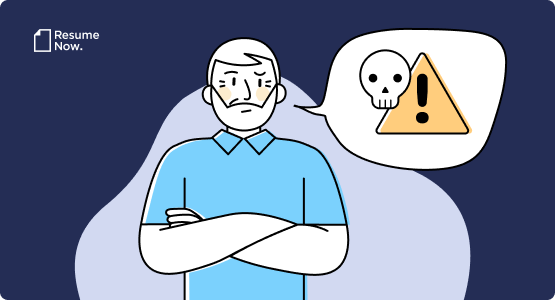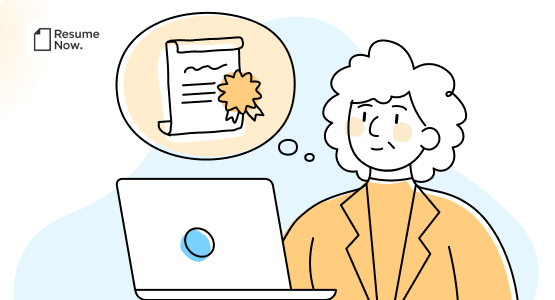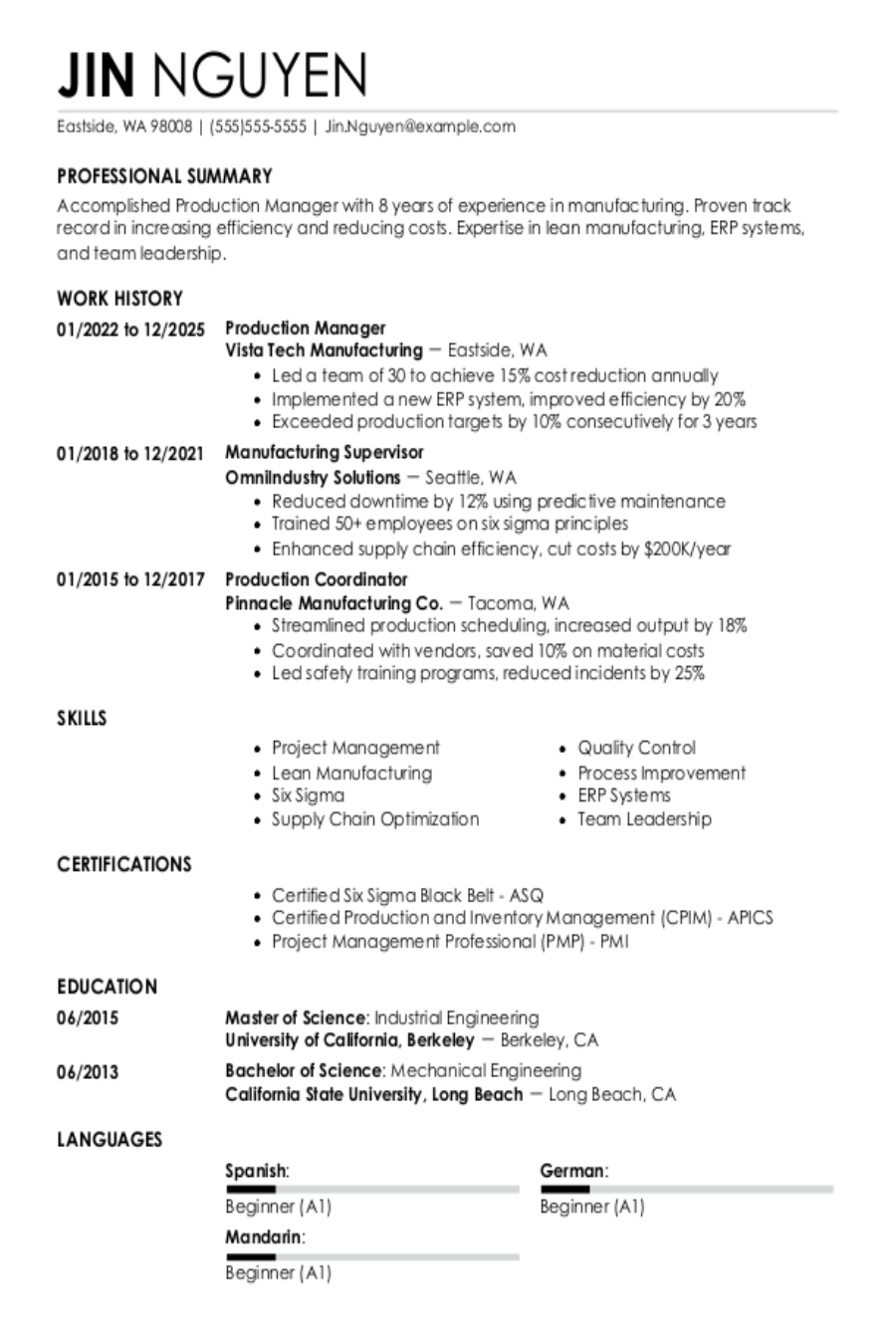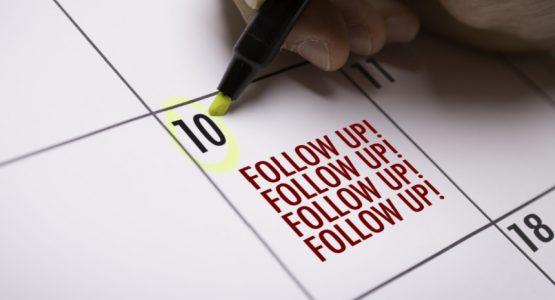Sending a follow-up email after a job interview is important, but how long should you wait? How should you word your email? How can you be sure that the employer is left with a positive impression of your abilities and skills?
Whether it’s been two weeks or one day, following up after an interview is how you stay on the employer’s mind. It shows persistence and a genuine interest in the role. It’s also an opportunity to show gratitude and professionalism.
Read our guide to get answers to your questions and view sample follow-up emails that you can use for reference as you write your own.
In this guide, we’ll cover common post-interview follow-up scenarios like:
- Your immediate follow-up email
- When to send a second follow-up email
- Whether to send a follow-up after no response
- How to follow up if you have another offer
- Following up after a phone interview
We’ll also touch on a bunch of frequently asked questions—from how to write the perfect subject line to whether phone interviews require a different strategy.
Need to update your resume before getting into the interview process? Streamline your process with our AI Resume Builder. Select a template to tell your professional tale and fill it with our hand-picked text suggestions tailored for your job title.
Related Guides & Tips
How To Write a Follow-Up Email After an Interview
If you’re wondering whether following up after an interview is a good idea, you can rest assured that you’re making the right move.
What happens after the interview is just as important as your interview preparation.
Sending a follow-up email after an interview shows the employer that you appreciate their time and that you’re interested in the role and actively engaged in pursuing it. Reminding the employer that you’re interested in further discussion is a great way to stay fresh in the employer’s mind and stand out from competing candidates who may not make the same effort.
Pro Tip:
Always personalize your follow-up email to reference specific points from your interview. This shows you were attentive and engaged during the conversation.
Now, let’s clear up some of the common concerns and questions related to writing an interview follow-up email.
When to follow up after an interview
Let’s start with the most pressing concern—timing.
Maybe three days have passed since your interview, and you’re wondering, is it too soon to send a follow-up?
Or perhaps two weeks slipped by, and you’re wondering if two weeks is too late to send an interview follow-up?
You want to be fresh in the interviewer’s mind when they receive your email.
While you can always send an email immediately following the interview, it’s a good rule of thumb to email between 24 and 48 hours after you talked.
That way, just as they might be moving on to other candidates, you’ll be reminding them of your interest in the role and the great conversation you had.
Pro Tip:
If you forgot to follow up within 48 hours, it’s still worth sending a note. Apologize for the delay and reiterate your enthusiasm for the role.
Identifying the right recipient(s) for your email
Figuring out who to send your follow-up email to can be equally as important as what you say in the email.
Here are some tips for different scenarios:
- One-on-one interviews:
After a one-on-one interview, it is fairly straightforward: send your follow-up email to the person who interviewed you.
- Panel interviews:
In the case of a panel interview, it would be respectful to send a personalized email to each member of the panel, acknowledging their individual inputs and perspectives during the interview.
- Group interviews:
If you were interviewed in a group setting (with other candidates), try to send your email to the lead interviewer or the person who coordinated the interview.
- Recruiters:
If your primary contact has been a recruiter, it’s a good idea to send them a thank you note expressing your continued interest in the position.
In all cases, if you don’t have key email addresses, it’s always fine to ask for business cards or contact information at the close of the interview.
You can also reach out to the HR department or whoever coordinated the interview to get the necessary details.
All of this makes for a smoother follow-up.
Crafting a perfect email subject line
Your email’s subject line is a minor detail, but it can make a big impact. Choose an appropriate subject line and ensure that it’s relevant and error-free.
Here are examples of well-written subject lines:
- Following Up: [Job Title] Phone Interview With [Interviewer’s Name]
- [Your Name]: Following up on the [Job Title] Interview
- Eager to explore the next steps with [Company Name]
Are you writing one from scratch? That’s great!
Consider using these instructions as you start writing:
- Keep it short and sweet:
Email subject lines are quickly scanned alongside dozens of others. A long one could get cut off, making it less obvious to employers who you are and why you’re reaching out. - Personalize it:
Don’t use spammy language. Mention the role, the interviewer’s name, your name, or the company name to make it as specific as possible. - AVOID ALL CAPS:
Caps are a huge turn-off in the professional world. You don’t want the reader to think you’re yelling at them. If you want to show excitement, it’s fine to use an exclamation point, sparingly. - Proofread:
Nothing is more frustrating than realizing you had a typo in your subject line. This is a small but serious mistake that can cost you a job. But it’s avoidable with proofreading. Run it by a friend first, just to be safe.
Pro Tip:
When proofreading your subject line, read it out loud. This can help you catch errors or awkward phrasing that you might miss when reading silently.
Follow-up email after interview: 4 examples
Let’s review a few templates for common follow-up email situations. Feel free to use them as they are or create your own version by combining your favorite parts of each.
Example of a formal follow-up email
Subject: Thank You for Your Consideration for the [Job Title] Position
Dear [Interviewer’s Name],
I wanted to express gratitude for the opportunity to discuss the [Job Title] position at [Company Name] yesterday. Our conversation left me with a deeper understanding of the role and the remarkable initiatives your team is spearheading.
I am particularly excited about the possibility of leveraging my expertise in [specific area of expertise] to further [Company Name]’s goals. I was encouraged by our discussion about [particular project or aspect discussed during the interview], and I am keen to bring my experience and skills to add value to such ventures.
I am confident that my background in [relevant skill or experience] aligns well with the [Job Title] role, and I am eager to potentially explore the depth of solutions I can offer in addressing the challenges and opportunities we discussed.
I would be happy to provide any additional information you may need. Thank you once again for considering my application and for the enriching conversation. I’m excited about the prospect of helping [Company Name] achieve its goals.
Sincerely,
[Your Name]
Example of an informal follow-up email
Subject: Had a Great Time Discussing the [Job Title] Role—Thanks!
Hey [Interviewer’s Name],
I can’t thank you enough for the great conversation we had regarding the [Job Title] role at [Company Name]. It sounds like an exciting opportunity, and I am thrilled by the idea of bringing my skills in [specific area of expertise] to your team. The more we talked, the more I could imagine fitting right in and hitting the ground running.
Thanks again for considering my application and taking the time to chat. I am very eager to potentially step into the [Job Title] role and collaborate with the awesome individuals at [Company Name].
Best,
[Your Name]
Example that references a company project
Subject: Excited About [Specific Project] at [Company Name]
Dear [Interviewer’s Name],
I wanted to extend my sincere thanks for our discussion today regarding the [Job Title] role at [Company Name]. It was heartening to hear about the [specific project] and the trajectory it is on. Your insights into how I could contribute to this through the role we discussed are well worth pondering.
Your passion for the project was truly contagious, and I would love the opportunity to become part of a team that works on such innovative initiatives. I believe that my experience with [specific skill/experience] would allow me to add value to the team and to [specific project].
Thank you once again for considering my application. I look forward to the possibility of working under your guidance and learning from your expertise.
Kind regards,
[Your Name]
Example that calls back to a specific personal detail about the interview
Subject: Appreciated the Insight Into [Company Name]
Hi [Interviewer’s Name],
Thank you for the enriching conversation yesterday. I particularly enjoyed learning about your love for [shared interest or topic]—it’s not every day that I meet someone who shares this interest!
I am excited about the opportunity to work at [Company Name], where the team values innovative projects like [specific project]. I am confident that my background in [specific skill/experience related to the job] would allow me to effectively contribute to your team.
I look forward to possibly bringing this shared perspective to the [Job Title] role and hopefully having more of these engaging discussions with you and the team.
Thank you once again for considering my application, and I hope to have the privilege of possibly working together in the future.
Best,
[Your Name]
What do you do when you get no response? Send a second follow-up email, of course!
Sending a Second Follow-Up Email After an Interview
Nobody likes feeling like a nag, but responding to emails is an important part of recruiters’ and hiring managers’ daily responsibilities. You don’t need to worry about being annoying when sending a second follow-up email.
Most employers will appreciate your diligence and be grateful that you reached out. Just be sure to leave some space between your first and second follow-up attempts.
When to send your second follow-up email
The ideal time is between three to seven days after your first follow-up before reaching out again.
If you send it too soon, it may overwhelm the employer before they’ve had a chance to process your first message. If you wait too long, you’ll risk missing out on the job.
Again, the sweet spot is three to seven days after your initial follow-up.
Pro Tip:
Make sure your second follow-up is concise and to the point. Reiterate your interest and ask if there are any updates or additional information needed.
Don’t forget to write a thoughtful subject line.
Second follow-up email after interview [template]
Subject: Continuing Our Conversation on [Job Position] Role
Dear [Interviewer’s Name],
I hope you’re doing well. I’m reaching out again to express my continued interest in the [Job Position] role at [Company Name]. Our conversation on [specific date] reinforced my belief that I can contribute effectively to [specific project or team].
I understand that hiring decisions involve numerous considerations and can take time. If there are any further details or references you require from me, please don’t hesitate to ask.
Thank you for considering my application. I’m hopeful for an opportunity to further discuss how I can add value to your team.
Warm regards,
[Your Name]
Next, we’ll discuss your best course of action when you’re not getting a response.
Sending a Follow-Up Email When There’s No Response
What if you’ve sent a follow-up email… and then a second follow-up email and you still haven’t heard back from the employer? Is it time to give up?
Not quite. At this stage, there’s no harm in sending a third email. It never hurts to have confidence and remind the employer of your interest one last time.
Are you guaranteed a response from the employer? Of course not. But the purpose of a follow-up is to stay fresh in the employer’s mind as they work through the decision-making phase of the hiring process. A third and final follow-up email may help you do just that.
A final follow-up email when there’s been no response
Here’s what to include in one final follow-up email when you’re simply trying to reach closure.
Subject: Final Check-In Regarding the [Job Title] Position
Dear [Recipient’s Name],
I’m reaching out one last time about [specific topic or reason for reaching out]. I understand that we all have busy schedules, and some emails might get overlooked.
I continue to be interested in the [Job Title] role and appreciate the time you’ve taken to consider my application. If circumstances change or if there’s an opportunity in the future where my skills or expertise align with your needs, I’d be glad to hear from you.
Wishing you all the best in your endeavors.
Warm regards,
[Your Name]
[Your Contact Information, if appropriate]
Sending a follow-up email if you have another job offer lined up
Of all the follow-up emails to write, the most exciting is the one you send after receiving a job offer. At this stage, you’re already making significant progress on your job search. Now, you have the chance to show the employer that you’re an in-demand candidate and give them one more chance to hire you.
After all, if they are interested in you, letting them know you already have a concrete offer might be just what they need to finally make a decision.
Here’s what that email should sound like:
Subject: Update on My Job Search Status
Dear [Interviewer’s/HR Manager’s Name],
I hope this message finds you well. I am reaching out to share an update on my job search journey. Recently, I was extended an offer for a [Job Title] role at another organization.
However, I am genuinely enthusiastic about the opportunity at [Company Name] and would sincerely prefer to be a part of your team, contributing to [specific project or team goal discussed during the interview].
Before moving forward with this other opportunity, I wanted to reach out and see if there was any update on the timeline for the [Job Title] position at [Company Name]. I am hopeful to hear any updates you may have, as I am eager to potentially join your team.
Thank you for your understanding and for any updates you can provide at this juncture.
Best,
[Your Name]
How To Follow Up After a Phone Interview
When all is said and done, are phone interviews any different than in-person or video interviews?
That entirely depends on the nature of the interview.
If this is a first-round interview after you’ve submitted your application, then the standard rules of follow-up emails apply.
If this is a recruiter screening call, then a different type of follow-up email may be in order. A recruiter call is usually not a comprehensive interview. In fact, a recruiter screening might happen before the employer gets a chance to view your resume. That’s why, in the follow-up email below, you’ll see beyond the usual niceties and enthusiasm that the applicant also includes their resume and a cover letter as an attachment.
Let’s review the example.
Follow-up after a phone interview
Subject: Following Up: [Job Title] Interview
Hi [Interviewer’s Name],
It was great speaking with you today. I am excited about the chance to bring my [specific skill/experience] to [Company Name]. Thank you for considering me for this role.
Please find attached my resume and cover letter for your reference. Let me know if you need any more information.
Best,
[Your Name]
Is it ever appropriate to follow up by phone?
Following your interview with a phone call should be a last resort.
Unless specifically suggested by the employer, you should follow up by email.
Why?
Emailing allows the employer to respond on their own time. You shouldn’t be following up to apply pressure—you’re just trying to keep a tab on the outcome. You can do that easily over email.
Should you use LinkedIn to follow up?
In general, a follow-up email would be more appropriate than following up over LinkedIn.
Save LinkedIn for the later stages of the process. If you learn you’ve been passed up for the role, you may want to add the recruiter or hiring manager on your professional social platform, especially if you had a good rapport.
Feel free to send them a couple of relevant articles and encourage staying in touch, once again expressing appreciation for the opportunity.
Next, let’s get into what not to do in your interview follow-up email.
What Not To Say in a Follow-Up Email
Here are five things you should steer clear of in an interview follow-up email:
Avoid negative language. Never blame the recipient for not emailing back by writing something like, “You never got back to me.” Steer clear of any language that comes off as frustrated. Always maintain a professional and neutral tone, even when you’re disappointed.
Don’t mention other companies. Unless you have an offer in hand, keep it to yourself. Citing your slate of interviews might come off as pressuring when they probably haven’t made a decision.
Avoid coming off as desperate. Desperation is a major turn-off in the job market and is often seen as unprofessional. Even seemingly straightforward phrases like “I need your response” could strike a hiring manager as overly pushy. Be unfailingly polite.
Never over-apologize. Yes, you should be polite, but avoid being excessively apologetic. Relying on phrases like “I’m sorry to bother you again” can undermine your standing with a company.
Don’t forget to say thank you. Gratitude is a good look. Failing to express it is bad. Thank the interviewers for their time and consideration, and make it clear you appreciate the opportunity.
To wrap up, read through the key takeaways list below.
Key Takeaways
Send an email shortly after the interview
To show you are proactive and thorough, send a follow-up email shortly after the interview. Somewhere between one and two days is perfect.
Keep it short and sweet
Don’t waste the hiring manager’s time. They’re probably busy, so respect their time with a brief, focused note.
Maintain a friendly and professional tone
Strike the right balance between warmth and professionalism by using appropriate language—for example, starting with a friendly “Hi” or “Hello” rather than “To whom it may concern.”
Limit the number of follow-ups
While it’s okay to send a second or even third follow-up, incessantly emailing can come off as unprofessional. Avoid seeming desperate or pushy.
Proofread your follow-up message
Can’t say it enough—always proofread and use spell check on your email before you hit send. We recommend having others review it, too, just to be safe.
Was this information about How To Send A Follow-Up Email After An Interview: 6+ Examples helpful? Let us know!
Don is a Certified Professional Resume Writer (CPRW) with more than 10 years’ experience creating digital content, including four years helping job seekers develop their careers. He holds an M.S. in Journalism from Northwestern University.
More resources

What if I Don't Have Professional References?
Access advice on what to do if you get to the reference check ...

The Most Dangerous Jobs in America: Some Pay Less Than $40K, Others Top $190K
Resume Now s report reveals the highest and lowest paying dang...

Still in the Game: 9 in 10 Older Workers Are Upskilling to Stay Competitive
The idea that older workers are resistant to change doesn t ho...

Mental Health Resume: Examples & Templates
Build & download your Mental Health resume in a few simple ste...

Pest Control Resume: Examples & Templates
Build & download your Pest Control resume in a few simple step...

Interview-winning Production Resumes Examples and Tips
Build & download your Production resume in a few simple steps....
